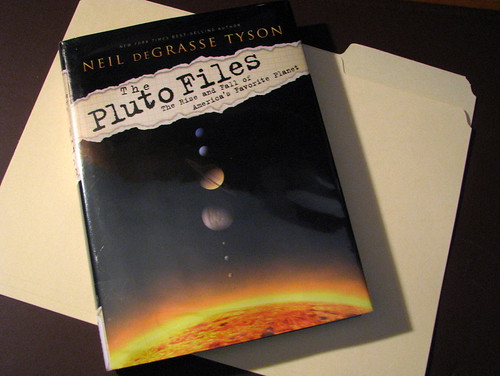Seventy-nine years ago today in Flagstaff, Arizona, young Clyde Tombaugh noticed a dot move on successive photographic plates. It was Pluto shifting against a background of fixed stars. For the next three-quarters of century, Pluto was the oddball ninth planet known to every school kid in the world, but too dim for nearly anyone to see. It was icy and small, but quite a few people had a warm fondness for it.
 A few years ago, as if arrogantly rewriting the laws of nature, a committee of astronomers voted to demote poor little Pluto from planet status. And then there were eight.
A few years ago, as if arrogantly rewriting the laws of nature, a committee of astronomers voted to demote poor little Pluto from planet status. And then there were eight.
[Insert violin music.]
I’m making light of this because I saw the whole episode as comical and inevitable. Scientific discoveries happen. Labels change. I have no problem with that. I grew up knowing about brontosaurus and Canada geese and planet Pluto. Now I know about apatosaurus (the reclaimed original name of bronto), Cackling geese (a reclassified cousin of Canada geese after the species was split a decade ago), and dwarf planet Pluto.
The emotional story of Pluto is affectionately told in The Pluto Files [LibraryThing / WorldCat] by Neil deGrasse Tyson. I say “affectionately” not because Tyson was sentimental about Pluto’s planethood. He wasn’t. His museum, in fact, was one of the first to separate Pluto from the other eight planets. And not because he enjoyed the headaches and media circus that surrounded the demotion. I say it because Tyson clearly loves astronomy. The subject is dear to him and it shows in his writing.
Pluto’s story is a tale of passions and Tyson shares them all. The book is filled with the emails and letters of irate museum visitors and saddened elementary school kids. Comments from Bill Nye, Stephen Colbert, Jay Leno, and countless headline-writing humorists worm their way into the text, too. Between them, Tyson emerges as the rational, understanding scientist he is.
The International Astronomical Union’s decision makes sense, as far as I’m concerned. Astronomers believed Pluto was a planet when Tombaugh discovered it in 1930, just as they gave Ceres the same label when it was new to them in 1801. Over time we learned more about both and discovered additional celestial bodies like them: more asteroids like Ceres and more small icy Kuiper* Belt objects like Pluto. It became inevitable that we either count everything as planets or reclassify them as something else. The IAU made the right call.
Clyde Tombaugh discovered Pluto. That fact hasn’t changed. What we know about Pluto has changed, though. That’s science.
Tyson’s book leads us through the facts of the case, the pros and cons, and the emotions and wisecracks surrounding the reclassification. The whole demotion episode was a minor astronomical matter but it spawned surprising emotional reactions throughout popular culture. Illustrated with humor and written in plain English, The Pluto Files makes for a pleasant diversion.
*Kuiper rhymes with piper. The Kuiper Belt is a zone of comet-like objects orbiting the sun beyond Neptune.

